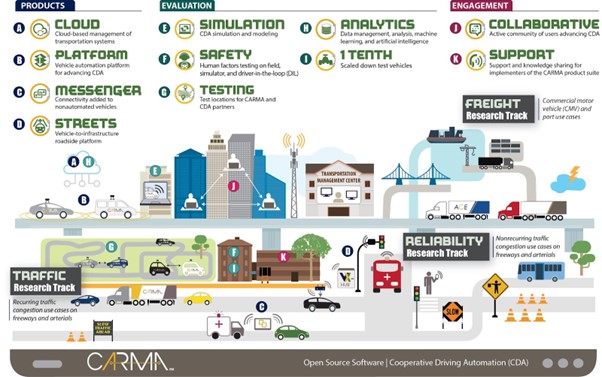By Ines Aviles-Spadoni, M.S., UFTI/STRIDE Research Coordinator
Researchers affiliated with I-STREET, the University of Florida Transportation Institute Living Lab, are evaluating CARMA, a program developed by the Federal Highway Administration (FHWA), through a project funded by the Florida Department of Transportation (FDOT) titled “Evaluation of CARMA for I-STREET Testbed Implementation”.

CARMA is a program that advances research and the development of cooperative driving automation (CDA) with the objective of accelerating market readiness and deployment. CARMA uses a multimodal approach to inspire collaborative research for potential implementation.
CARMA also contains a multimodal open-source software platform knows as CARMA3 and is available on GitHub. And finally, CARMA is looking at both connectivity and automation together, supporting automated vehicles to cooperate by streamlining communications between vehicles, infrastructure devices, and other road users such as pedestrians, bicyclists, and scooters. Safety and efficiency is the number one goal of CARMA.
Essentially, CARMA gets researchers to work together on technology, on open-source tools, and to create frameworks with the goal of enhancing mobility, safety, and efficiency in the transportation industry through automated driving and vehicle-to-everything (V2X) technologies. CARMA is comprised of three components: the main products, the evaluation tools, and the engagement platforms (see image).
At I-STREET, researchers such as Dr. Pruthvi Manjunatha and Dr. Nithin Agarwal are evaluating CARMA for potential implementation on the road network which makes up the I-STREET Living Lab. Specifically, they are assessing the various stages of development for each of the products in the CARMA suite to find out if those could be readily implemented in the Living Lab.
“We are trying to answer the question of what does a CARMA enabled system looks like,” Manjunatha said. “What hardware and software elements are required, what is the specification, the recommended models and alternatives, what are their costs, advantages and disadvantages. This will help us to develop CDA use cases that can be implemented on I-STREET.”
The researchers are developing “use cases” for CARMA technology on the existing transportation system in Gainesville. More specifically, on how to utilize the CARMA ecosystem to improve pedestrian and bicyclist safety in the I-STREET road network – one which contains many modes such as pedestrians, bicyclists, scooters, mopeds, buses, and cars.
The potential for implementation, including the equipment and cost range are also being evaluated in this project. The use cases detail the challenges for pedestrians and bicyclist safety in Gainesville, FL.
“Implementation of CARMA enabled technology on I-STREET has the potential to improve safety in Gainesville and inform the state/nation on efficient utilization of CDA applications,” Manjunatha said.
The evaluation of the CARMA program for implementation into the I-STREET has practical implications because FHWA is actively encouraging collaborations between academia and industry to develop various applications. The I-STREET Living Lab in Gainesville is an ideal location and its deep connection to academia and industry aligns well with FHWA’s goal for CARMA.